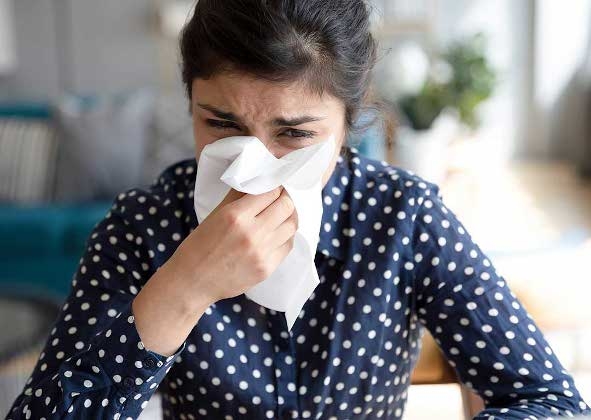How Does the Nose Work?
Understanding how the nose works can help explain what happens when it gets triggered.
Air is drawn into the nose by the pull of the diaphragm expanding the lungs. That air moves through your nostrils, which are lined with hair used to trap and filter particles such as dust, pollen, and bacteria. The air passes through several chambers (sinuses) to be humidified and warmed before hitting the lungs.
But if your nose detects an excess of foreign or harmful particles, you might feel a tickle that triggers a sneeze. This is one of the ways your body expels pathogens to keep your nasal passageways clear.
Your nose can also create a sticky, slimy substance called mucus, which works to push out particles that the hair in your nose has trapped. A stuffy or runny nose may occur when the sinuses need to drain out the particle-filled fluids before you get an infection.1
What causes a runny or itchy nose?
Have you noticed that your nose tends to get runny whenever you cry? This is because of the tear ducts beneath the eyes that drain into the nose. It is also why you may experience multiple symptoms at once during an allergic reaction, as many parts of your facial passageways are connected. It is not uncommon for sneezing and post-nasal drip (mucus at the back of your throat) to also trigger symptoms such as watery eyes, stuffy nose, and coughing. 2
Apart from your body’s natural response to kick out irritants, there are other reasons why you may experience a runny or itchy nose. This includes:
Everyday allergens (pollen, grass, pet dander, dust mites etc.)
Environmental pollution (chemical fumes, heavy smoke, haze, air surrounding heavy traffic etc.)
Virus and bacteria which causes the common cold and a sinus infection
In the case of allergies, a runny and itchy nose is due to the production of a chemical called histamine. This chemical is naturally produced by your body’s immune system in response to detecting allergens.3 For example, if you breathe in air with lots of pollen particles, the histamine chemical will trigger sneezing to expel these ‘pathogens’ from your nostrils.
How to Alleviate an Itchy or Runny Nose
Can’t stop rubbing or wiping your nose? For irritating nose symptoms triggered by allergies, there are steps you can take to help minimize and relieve your discomfort.
Avoid Environmental Triggers
It may be surprising, but indoor air quality can be worse than the air quality outside since it tends to be more stagnant within a confined space.4 Consider getting air purifiers to reduce the particles floating through your home or office.
If you suspect that you have allergies, try avoiding common allergens such as pollen, dander, ragweed, and grass. You can also get tested so you know exactly which allergens to avoid, or when to expect heightened symptoms. Want to learn more about the types of allergy tests and how they work? Check out our What is an Allergy Test article.
Boost Your Immune System
Staying strong and healthy is an important step to fighting off infections and allowing your body to naturally defend itself. Eat a balanced diet and avoid excessive sugar or foods that can cause inflammation. You should also get plenty of rest throughout the day for your body to rejuvenate so that your immune system does not weaken.
Use a Humidifier
If you live in a dry environment, the air itself can be an issue. Use a humidifier to help keep your nose from getting too dry. This will soften the mucus and reduce inflammation. When your nose is moist, it is less likely to overcompensate for dry air by producing excessive mucus.
Drink Water
It may seem like a universal remedy but staying hydrated is important for your body and the nose to do its job. Whenever your nose produces mucus or when your eyes get watery from sneezing, your body is using water to flush out irritants and toxins. To get the right amount, drink at least 6-8 glasses (250mL) on average.5
Take an Over the Counter Medication
Looking to relieve your allergy symptoms? Try Reactine® Rapid Dissolve or Reactine® Liquid Gels, proven to help relieve runny nose and sneezing, as well as itchy nose and throat. These portable tablets work fast, and Reactine® Rapid Dissolve tablets disappear in seconds in your mouth, without the need for water. Perfect for on-the-go!
When to Seek Out Professional Care
If your runny or itchy nose lasts more than 10 days and you aren’t sure of the cause, you should speak to a healthcare professional. You should also schedule an appointment with your doctor if thick, yellow and green mucus is accompanied by fever or sinus pain—these may be signs of a bacterial or viral infection and should not be treated as an allergy.
Always consult your doctor if you are still unsure of your symptoms and remember that OTC medications should always be taken as directed on the label. If your symptoms persist or worsen, seek professional assistance from your doctor.











